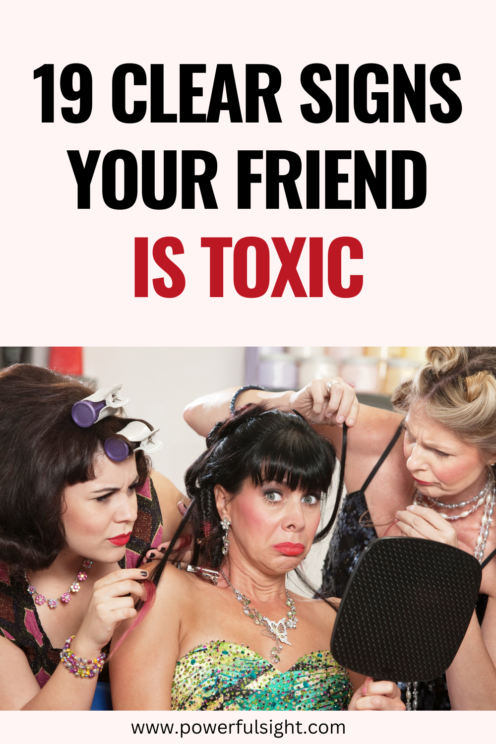Toxic friendships are relationships that consistently bring negativity, drama, and emotional distress into our lives.
These friends may exhibit manipulative behaviors, constant criticism, or a lack of genuine support.
Recognizing the signs of a toxic friendship is the first step in protecting your well-being and cultivating healthier connections.
Signs of a Toxic Friend
1. Manipulative Behavior
Manipulation is a hallmark of a toxic friend.
They may use emotional blackmail, guilt-tripping, or subtle coercion to get their way.
These friends often make you feel like you owe them something or that you’re the one who is being unreasonable.
They may also try to isolate you from other friends or family members, making you more dependent on them.
2. Constant Criticism
Toxic friends often find fault in everything you do, whether it’s your appearance, your choices, or your accomplishments.
They may disguise their criticism as “tough love” or “helpful advice,” but their comments are ultimately undermining and damaging to your self-esteem.
3. Lack of Support
A true friend should be a source of encouragement and support, but a toxic friend may be indifferent or even dismissive when you’re going through difficult times.
They may fail to show up for you emotionally or offer practical help when you need it most.
4. Jealousy and Competition
Toxic friends may feel threatened by your successes and achievements, and they may try to sabotage your efforts or belittle your accomplishments.
They may also engage in constant one-upmanship, always trying to prove that they are better than you.
Related: Signs of a jealous friend
5. Controlling Tendencies
Toxic friends may try to dictate how you should live your life, what you should wear, or who you should spend time with. They may also try to control the narrative of your relationship, always insisting on their way or making you feel guilty for not doing what they want.
Related: Signs of a controlling boyfriend
6. Negativity and Pessimism
Toxic friends often have a negative outlook on life, constantly complaining and focusing on the worst-case scenarios. They may drag you down with their constant negativity, making it difficult for you to maintain a positive mindset.
7. Lack of Boundaries
Toxic friends may have a complete disregard for your personal boundaries, constantly invading your space, time, or privacy without your consent. They may also fail to respect your need for alone time or space to recharge.
Related: How to set boundaries with friends and enforce it
8. Gaslighting
Gaslighting is a manipulation tactic where a toxic friend tries to make you question your own reality, memory, or perception of events. They may deny or minimize your experiences, leaving you feeling confused and unsure of yourself.
9. Draining Your Energy
Spending time with a toxic friend can be emotionally and mentally draining. You may find yourself constantly on edge, anxious, or exhausted after interacting with them, even if the interaction was relatively brief.
10. Always Playing the Victim
Toxic friends often have a victim mentality, blaming others for their problems and refusing to take responsibility for their actions. They may use this tactic to garner sympathy or avoid accountability.
11. Betrayal and Backstabbing
Toxic friends may betray your trust by sharing your personal information with others, gossiping about you, or even sabotaging your relationships or opportunities. They may also turn against you without warning, leaving you feeling blindsided and betrayed.
12. Lack of Accountability
Toxic friends often refuse to take responsibility for their actions or the impact they have on others. They may make excuses, shift blame, or deny any wrongdoing, making it impossible to have a constructive dialogue about the issues in the relationship.
13. Difficulty in Celebrating Your Success
While a true friend would be genuinely happy about your achievements, a toxic friend may feel threatened by your success. They may downplay your accomplishments, make passive-aggressive comments, or even try to undermine your efforts.
14. Always Taking, Never Giving
Toxic friends often have a one-sided relationship, where they are constantly taking from you without reciprocating. They may ask for favors, emotional support, or financial assistance, but they rarely offer the same in return.
Related: Signs your friend is struggling
15. Disrespectful Behavior
Toxic friends may exhibit disrespectful behaviors, such as interrupting you, dismissing your opinions, or making inappropriate comments. They may also engage in verbal or emotional abuse, such as name-calling or belittling you.
16. Constantly Making You Feel Guilty
Toxic friends may use guilt as a manipulation tactic, making you feel responsible for their emotions or actions. They may guilt-trip you into doing things you don’t want to do or make you feel guilty for setting boundaries.
17. Lack of Empathy
Toxic friends often lack the ability to empathize with your feelings or experiences. They may be insensitive, dismissive, or even indifferent to your emotional needs, leaving you feeling unsupported and misunderstood.
18. Ignoring Your Boundaries
Toxic friends may repeatedly cross your boundaries, even after you’ve clearly communicated them. They may disregard your requests for privacy, time, or space, or they may continue to engage in behaviors that make you uncomfortable.
19. You Feel Drained and Unhappy Around Them
If you consistently feel drained, anxious, or unhappy after spending time with a friend, it may be a sign that the relationship is toxic. Your overall well-being and mood should not be negatively impacted by your interactions with a friend.
Conclusion:
Once you’ve identified the problematic behaviors, you can take steps to set boundaries, communicate your concerns, or even consider ending the relationship if necessary.
Remember, your well-being should be the priority, and you deserve to have fulfilling, supportive friendships in your life.
Save the pin for later
